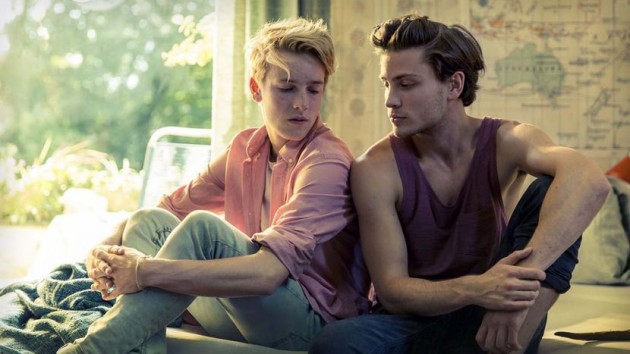
Dir.: Jakob M. Erwa; Cast: Louis Hofman, Sabine Timoteo, Philine Stappenbeck, Svenja Jung, Jannick Schümann, Alexander Gersak, Nina Proll; Germany/Austria 2016, 114 min.
Writer/director Jakob M. Erwa bases his latest film on Andreas Steinhöfel’s Coming-of-Age novel of the same name, with a good ensemble cast. Erwa is Austrian but one of many of his fellow countrymen to use the German language primarily to make a statement (‘Thesenfilm’). Erwa adopts an overly didactic approach that rathe undermines his viewers’ intelligence, treating the cinema like a lecture theatre. On top, there is more than enough narrative material in the novel, which carefully shortened and structured, could have avoided the unnecessary running time of nearly two hours, filled often with repetitive panning shots of the woods.
Seventeen-year-old Phil (Hofman) lives with his twin sister Diane (Stappenbeck) and mother Glass (Timoteo) in a “Märchenhaus” or ‘fantasy cottage’ near the woods. All they know about heir father is that he was American and number three on the list of her mother’s lovers, his name black-balled. Glass is still rather promiscuous and why she’s chosen to take her children to Germany remains open. Sister Diane is very good and training dogs, and was once arrested for telling a dog to attach its owner. Phil’s girlfriend Katja (Jung) is the polar opposite of her brother: she is fun-loving, whilst Phil is a worrier. When a new boy, Nicholas (Schümann) joins their class, Phil falls in love with him. They have rather awkward sex in the shower and Phil is too cowardly to tell Katja about his new lover at first, pretty soon she joins in the ménage-a-trois. But when Phil surprises the two having sex, he withdraws, telling Nicholas “that he wants him for himself”. At the same time, Diane keeps visiting her boyfriend in a coma in hospital, after he was injured during a storm. Her guilt feelings are compounded by an old family secret, and Phil feels that he has not only lost Katja and Nicolas, but also his sister. His erratic mother is no help, and he has to make a choice.
Erwa’s overly didactic approach feels rather condescending: too much philosophical spoon-feeding is self-indulgent, and mistakenly sees the cinema as a place for a lecture, rather than entertainment. There is more than enough narrative material in the novel, which, carefully shortened and structured, could have shortened the overlong running time stuffed with over-repetitive panning shots of the woods. Long dissolves and embarrassing slow-motion sequences echo the worst excesses of the 70s. Finally, the language: teenagers all over the world do not express themselves like Phil: “A small sliver of cold got between us”. And adults don’t talk to teenagers in parables about life as “a house with many rooms, some empty: “You lock your fear in one of the empty rooms”. What may work as “Bildungsroman” – and there are certainly parallels to the “Young Werther” – is simply too clumsy and lacks conviction on the screen. A little less would have been much more – plus a heavy dose of what is called understatement, avoiding a non-stop parade of over-the-top dramatics. AS
ON GENERAL RELEASE FROM 15 SEPTEMBER 2017